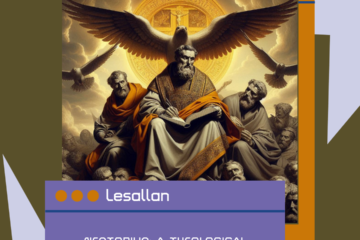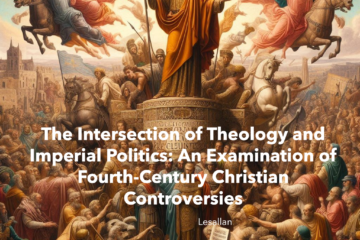
Revelation 2:1-7 (ESV) Detailed Analysis Discussion: The Church in Ephesus
Written by Lesallan Bostron April 28, 2023
BIB3560 Revelation (ONLSP23)
Ohio Christian University
Pastor Alexander Soultz

Revelation 2:1-7 (ESV) Detailed Analysis Discussion
Revelation 2:1-7 (ESV) is a passage from the book of Revelation, the last book of the Christian Bible (Revelation, ESV). The chosen passage is a letter from Jesus Christ to the church in Ephesus, one of the seven churches in Asia Minor (modern Turkey). Within this letter are written both commendations and rebukes for the Ephesian Christians. Jesus has also given a promise to those who overcome, a promise to those that overcome and conquer. The literary context of the book is part apocalyptic, meaning that it uses symbolic and visionary language to reveal God’s plan for the end times and encourage the faithful to persevere in the face of persecution and temptation. Prophecy is also a part of this book of Revelation as it foretells future events and warns of God’s judgment on the wicked. The book of Revelation is also a letter, with an opening salutation, a body, and a closing benediction. Historically, John, the apostle, and the eyewitness of Jesus, wrote this book around the end of the first century AD. A time when the Roman Empire was ruled by Domitian, a terrible, cruel ruler who demanded that he be worshipped as a god or face persecution. This man, Domitian, persecuted Christians who refused to comply with his wishes. The church in Ephesus was one of the most prominent and influential churches in its day and time. Paul founded the church and then later led by Timothy and John. The church was known for its doctrinal orthodoxy and zeal for doing good. The church faced many challenges, from false teachers to idolatry, immorality, and spiritual decline. The canonical context of this passage (Revelation 2:1-7, ESV) is that it is a part of the New Testament canon. The New Testament canon is a collection of authoritative writings testifying that Jesus Christ is God’s Son and the world’s Savior, the author, and creator of life. The author and creator of all things written in the Christian Bible. The book of Revelation complements and completes the other book of the Bible by revealing the outcome of God’s redemptive plan for His people and creation. Found throughout the book of Revelation are many themes and images from the Old Testament canon: Exodus, the Temple, the Covenant, the prophets, and the Psalms. Other connections to the other books of the New Testament that address similar issues can are found in books such as 1 Peter, Hebrews, James, 1 John, and Jude.
The passage chosen for last week’s detailed analysis assignment was Revelation 2:1-7 (ESV), Jesus’ letter to the church of Ephesus Below are some insights that this student found:
Who is the “angel of the church” that Revelation 2:1 (ESV) refers to?
While the identity of the “angel of the church” (Revelation 2:1, ESV) has not been explicitly stated in the passage, there are many different interpretations among Biblical scholars and commentators. According to Keener (2014), there are three major views on the “angels” of churches. One view is that they are messengers bearing the scroll to the churches (Keener, 2014, p. 731), heavenly messengers representing the churches, and communicating between God and the church. The second view is that the “angels” are public readers in each congregation, corresponding to the kind of messenger in the synagogues (Keener, 2014, p.731). These public readers correspond to the angel being a human messenger or leader of the church, such as a pastor, the elder, or the bishop. The third view is that they may be the guardian angels of each congregation. Some suggest that the third view may represent heavenly counterparts to earthly realities (the churches), symbolizing the heavenly significance of the churches: as the lampstands (Keener, 2014, p.731). Finally, the angel is a personification or symbol of the church, reflecting its character and condition. This view also would fit apocalyptic imagery (Keener, 2014, p. 731). Regardless of the exact identity of the angel, the main point is that Jesus knows and evaluates the church in Ephesus, having both praise and criticism for them.
Jesus knows his church’s works, toil, and endurance and commends them for their faithfulness and discernment (Revelation 2:2-3, ESV).
Like the period in which Revelation 2:2-3 (ESV) was written, the application of this passage is still relevant today. Jesus knows the challenges and struggles the church, and His believers face today. Jesus knows the pressures and temptations of living in a rapidly changing and often hostile environment. Jesus knows His followers’ efforts and sacrifices to remain steadfast in their faith and discerning amid false teachings and ideologies. Therefore, applying this insight to life in this contemporary world encourages us to persevere in our faith and service to Jesus. Believers know Jesus sees us and appreciates our works, toil, and endurance. When dealing with contemporary issues that affect our society, things like climate change, poverty, social justice, and inequality, this verse (Revelation 2:2-3, ESV) can motivate us to seek God’s guidance and wisdom. This passage also reminds us that it is Jesus who, in the end, is the judge and the One who will reward His church. Jesus (triune) will hold us accountable for our love and obedience to Him.
Jesus also rebukes his church for abandoning their first love, which is the love for him and one another (Revelation 2:4, ESV).
This verse gives insights into life today because we must examine our hearts and motives for following Jesus. Do we as people all have a love for Jesus in our hearts, soul, mind, and strength? Do we love our neighbors like ourselves? Do we show our love by obeying his commands and serving his people? Or have we become distracted, complacent, or indifferent to our first love? Another insight from this verse is that it can challenge us to repent and renew our love for Jesus and one another and express it practically. Inspiration can be found as we seek a deeper, more intimate relationship with Jesus. Finally, this verse reminds us that Jesus loved us first and foremost and wants us to love Him back with the same devotion and passion.
Jesus calls his church to repent and return to their first works, which are the works of love and obedience (Revelation 2:5, ESV).
One possible way to apply Revelation 2:5 (ESV) to life today is to evaluate our works and actions in full view of God, His will, and His word. People need to be sure that things being done are the things that please and glorify Him. We must follow Jesus’ commands and teachings and serve His kingdom and people. This verse urges us to repent and avoid anything hindering or harming our relationship with God. For those that have fallen away from God, this verse also can motivate us to do the works that were done when we were zealous and enthusiastic for God. This verse also encourages us to seek God’s help and empowerment to do His works and to rely on His grace and mercy.
Jesus warns his church that if they do not repent, he will remove their lampstand, representing their witness and presence in the world (Revelation 2:5, ESV).
This verse (Revelation 2:5, ESV) warns us of the consequences of unrepentant sin and being lukewarm in our faith. Applying this to life today is to realize the seriousness and urgency of repenting and love, that we must take action and make changes that will affect our lives. If repentance is not found, we risk losing our witness and presence. This loss and witness and presence in this world means losing our influence and impact on/for God’s kingdom. This means losing our intimacy and fellowship with God, who walks among the lampstands.
Jesus promises his church that if they overcome, he will grant them to eat of the tree of life, which is in the paradise of God (Revelation 2:7, ESV).
Jesus’ promise to the church and believers of His day can still be applied to life today. Jesus promised hope and reward to those who remain faithful and loyal amid trials and temptations. Overcoming means we conquer and prevail over the evil forces and influences opposing God and His people. The promise that Jesus has given “to eat of the tree of life” (Revelation 2:7, ESV) means to enjoy eternal life and happiness with God in His paradise, that which is the promised, resorted, and renewed creation. By the power and grace of God, we are reminded and inspired to persevere and endure until the end, always being mindful that we have a glorious future. It is by His Spirit and word that we can overcome.
This student prays that these insights can help you understand the importance of loving God and others as the foundation of Christian life and the consequences of losing our first love. They can also encourage us to persevere in faithfulness and discernment and to look forward to the reward of eternal life with God.
Did the church in Ephesus or the people ever heed Jesus’ Warning and restore their first love?
Peace and Blessings to All,
~Lesallan
References:
Bostron, L. (2023). The Christian Thing. Thechristianthing.com. https://thechristianthing.com/
G3340 – metanoeō – Strong’s Greek Lexicon (ESV). (n.d.). Blue Letter Bible. Retrieved April 24, 2023, from https://www.blueletterbible.org/lexicon/g3340/esv/mgnt/0-1/
Keener, C. S. (2014). The IVP Bible background commentary: New Testament. Intervarsity Press.
Revelation 2:1-7 ESV – – Bible Gateway. (2016). Www.biblegateway.com. https://www.biblegateway.com/passage/?search=Revelation%202:1-7&version=ESV
Revelation 2 – ESV Bible – Bible Study Tools. (n.d.). Biblestudytools.com. https://www.biblestudytools.com/esv/revelation/2.html
Smith, Dr. W. (1901). Nicolaitans – Smith’s Bible Dictionary Online. Biblestudytools.com. https://www.biblestudytools.com/dictionaries/smiths-bible-dictionary/nicolaitans.html
Strong’s Concordance. (1890). Strongsconcordance.org. https://strongsconcordance.org/


